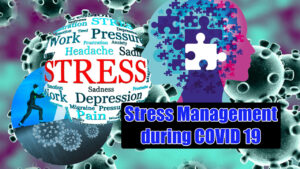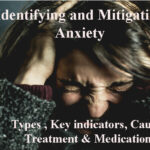Depression pandemic and other mental health issues, are peaking in the COVID era. Here are #5 ways to stay upbeat in an atmosphere of fear through which you can overcome depression resulting from the drastic changes in lifestyle.


The COVID – 19 pandemic has created massive economic and social changes and the very fabric of our daily life stands altered. Unfortunately, the widespread apprehension that surrounds us has also taken a toll on the mental health of many of us. Depression or feeling sad often is a common side effect of the COVID pandemic that many are experiencing. Mental health issues, especially depression, are peaking in the COVID era. This has been proven by recent studies by researchers globally.
The International Labour Organisation published the results of a 2020 study. The global study says that one in two youths worldwide is prone to depression and anxiety in COVID times. Further, another recent 2020 scientific study studied the prevalence and impact of depression from January of this year. The study reported that depression had increased 25 times from 2017 among the general population. The depression rates during the COVID pandemic were higher than the levels than during the SARS and Ebola epidemics.
What is Depression?
Depression is characterized by all or some of the following signs symptoms for most of the time, every day and lasting for at least two weeks or more:
- Feelings of irritability, sadness
- Feeling hopeless or worthless
- Difficulty in sleeping
- Over-eating or not feeling hungry
- Loss or increase in weight
- Difficulty in concentration
- Loss of interest in daily tasks
- Reduced or lack of a sense of enjoyment in life
- Thoughts of harming oneself
- Headaches, muscle aches, or digestive problems
Why is Depression at an all-time high?
Researchers suggest that lockdown measures and the resulting social isolation are one of the primary causes of depression and psychologic problems during the pandemic. Health workers, infected persons and their families who have stayed in quarantine, and younger age groups such as students are more at risk for developing mental health issues. Young people are more at risk of developing depression because they face uncertainty about their futures.
Further, irregular school and exam patterns, social media exposure, and unemployment because of the pandemic contribute to stress and anxiety. The uncontrollable events unfolding all around the world have had an adverse impact on health, social life, and the economy and created a global mental health challenge.


5 Ways to stay upbeat during the COVID pandemic
The good news is that there are ways by which you can work towards nurturing your mental health and ensure that you deal with the COVID crisis successfully. Here are five techniques through which you can overcome depression resulting from the drastic changes in lifestyle and attitudes over the past months:
#1 Regular routine
Uncertainty is best combated by maintaining a regular daily routine of work and rest. Fixed schedules of everyday work may help you feel a sense of control over your world when everything around you is rapidly changing due to the pandemic. Creating fixed daily schedules of waking up, eating, exercise, and relaxation can be very beneficial in coping with depression that results from loss of daily routines that existed pre-COVID.
#2 Socialization without contact
Social isolation and the loss of engagement with friends and family have created a dismal and depressive atmosphere for many people. Looking for ways to stay in touch with others virtually may help ease feelings of distance and loneliness. In the digital era, high-speed internet is readily available so make the most use of it through apps and chats to experience relief from stress and depression.
#3 Essential exercise
The American Psychologic Association and the World Health Organization both recommend exercise as a powerful technique to ward away depressive emotions, especially during the pandemic. Exercise boosts the fitness of both the body and mind. The benefits of daily exercise in combating depression include:
- Decrease in stress
- Mood upliftment
- Reduced anxiety and worry
- Better focus and concentration
#4 Sleep away your troubles
Sleep is a big reason for feeling irritable, tired, and drained of energy. A regular sleep cycle is necessary, particularly now, when COVID-related fears and uncertainties are disrupting daily life. Simple ways to ensure a good night’s sleep include:
- Restriction of caffeinated drinks before sleeping
- Fixed sleep times
- Unplug electronics at bedtime
- Dim your room lights at bedtime
- Think calm and peaceful thoughts before sleeping
#5 Talk therapy
Depression is often surrounded by a stigma and the thought of speaking with a therapist may seem daunting. However, talking out your fears and anxieties with a skilled therapist has many advantages. Carrying the burden of sadness and depression alone can be a heavy load, and speaking with someone, especially a psychologist may offer an empathetic listening ear and also useful solutions to your problems.
Depression can be extremely problematic in the climate of COVID because so many problems already exist on a social, economic and inter-personal level. Feelings of negativity and sadness make the weight of the pandemic more difficult to bear. However, through adequate rest, a scheduled lifestyle filled with regular virtual contact with loved ones, exercise and meditation, you can make the best of a difficult situation that has descended on the entire world.


Dr. Preetika Chandna
H-392B, H block, Shastri Nagar, Meerut – 250004,
Uttar Pradesh state
Ph: 01213590362 / +91 97600 32110
Email : info@meerutdentalandpsychologyclinic.in
meerutdentalandpsychologyclinic.in
References
https://www.ncbi.nlm.nih.gov/pmc/articles/PMC7458054/
https://www.nimh.nih.gov/health/topics/depression/index.shtml#part_145397
https://www.ncbi.nlm.nih.gov/pmc/articles/PMC7458054/#bib0075
https://www.ncbi.nlm.nih.gov/pmc/articles/PMC7194662/
https://journals.plos.org/plosone/article?id=10.1371/journal.pone.0231924
https://www.mdpi.com/2077-0383/9/4/965/htm
https://www.apa.org/monitor/2011/12/exercise
https://www.who.int/mental_health/mhgap/evidence/depression/q6/en/











